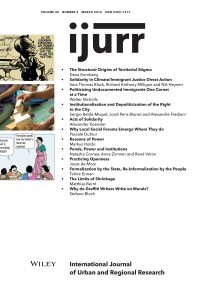This article demonstrates residents’ transformative practices and discusses attendant outcomes to contribute to an understanding of state-built housing estates for people affected by urban transformation projects. It draws upon ethnographic fieldwork conducted in a social housing estate (K-TOKI) in the Northern Ankara Entrance Urban Transformation Project (NAEUTP). It addresses questions on why formalization of informal housing takes place today, under what conditions it is countered by re-informalization practices, and what the outcomes of this process are. As informal housing became formalized by NAEUTP, gecekondu dwellers were forced into formalized spaces and lives within K-TOKI, which was based on a middle-class lifestyle in its design and its legally required central management. Informality re-emerged in K-TOKI when the state’s housing institution, in response to the estate’s poor marketability, moved out, allowing residents to reappropriate spaces to meet their needs and form their own management system. When cultural norms that are inscribed in the built environment and financial norms that treat residents as clients conflict with everyday practices and financial capabilities, the urban poor increasingly engage in acts of informality. I argue that the outcome of this informality in a formal context is a site of multiple discrepancies.

